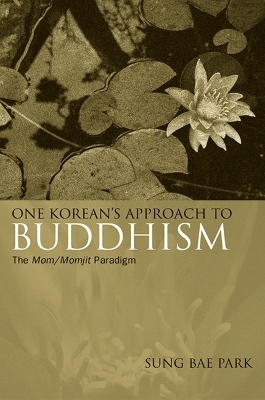
One Korean's Approach to Buddhism
State University of New York Press (Verlag)
978-0-7914-7698-7 (ISBN)
This book presents the author's lifelong study and practice of Buddhism from a Korean perspective. With depth, sensitivity, and candor, Sung Bae Park discusses his country's contribution to Mahayana Buddhism and also shares his personal experience. A monk in the Korean Chogye order during his early twenties, Park is uniquely qualified to offer the reader some valuable insights into the experience and philosophy of the Zen Buddhist.
Focusing on the Korean concepts mom (which refers to the body) and momjit (which refers to its gestures or functions), Park examines their nondual, interdependent nature and their relevance to ordinary human beings who are living in these turbulent times. He also introduces a specialized spiritual practice using the hwadu, which aids the religious practitioner in loosening his conceptual, intellectual grip on his life and the world around him. In addition, the author explores the relevance of his views to other religions and philosophies, including Taoism, Confucianism, and Christianity. Those well acquainted with Buddhism will find much food for thought here, as familiar topics such as emptiness, nonduality, and enlightenment are presented in a refreshingly original way, and those new to Buddhist thought may find themselves stimulated to learn more. A helpful glossary of terms is included.
Sung Bae Park is Professor of Asian Philosophy and Religions and Director of the Center for Korean Studies at Stony Brook University, State University of New York. He is the author of Buddhist Faith and Sudden Enlightenment, also published by SUNY Press.
Preface
Introduction
Chapter One: Initial Considerations
Sociological Concerns
Individual Needs
Human Ignorance
Ordinary and Absolute Aspects
Suffering
Definition of Mom and Momjit: A Closer Look
The Experience of Mom
Practical Applications
Stages of Access
Coexistence of Mom and Momjit
Two Dimensions of Human Existence
Chapter Two: Mom and Momjit as Tools for Transformation
The Need for Transformation
The Use of the Hwadu
Initial Thoughts on Hwadu Practice: The Three Disciplines
No-Thought
Getting Down to Practice
Faith and Doubt
Faith and Surrender
Faith and Understanding
What Is Enlightenment?
No Need for Transformation
Attaining Salvation?
The Strange Behavior of Zen Masters
Problems in Practice
The Nature of the Problem
The Real Meaning of Hwadu
The Solution
The Nature of Death
Chapter Three: Other Teachings
WÆnhyo’s Commentary on the Awakening of Mahåyåna Faith (First Chapter)
WÆnhyo’s Treatise on the Vajrasamådhi S¨tra (First Chapter)
WÆnhyo’s Logic of Negation
Hua-yen Theory
The Diamond S¨tra
The Seminal Message of the Platform S¨tra
Chinul
Chinul and the Three Gates
Chinul’s Views on Hwadu Meditation
Chinul’s “Enemy”
Ch’an and Taoism
Confucianism
Chapter Four: Present-Day Applications
Letter and Non-Letter Culture/One Mind
Stages of Practice
The Raft
Faith Revisited
Daily Practice
The Unknown Factor
Desire
The Five Stages of Practice According to Chinul
Personal Story
Conclusion: Final Thoughts on Mom and Momjit
Notes
Glossary of Terms
Bibliography
Index
| Erscheint lt. Verlag | 29.1.2009 |
|---|---|
| Reihe/Serie | SUNY series in Korean Studies |
| Zusatzinfo | Total Illustrations: 0 |
| Verlagsort | Albany, NY |
| Sprache | englisch |
| Maße | 152 x 229 mm |
| Gewicht | 236 g |
| Themenwelt | Geisteswissenschaften ► Religion / Theologie ► Buddhismus |
| ISBN-10 | 0-7914-7698-7 / 0791476987 |
| ISBN-13 | 978-0-7914-7698-7 / 9780791476987 |
| Zustand | Neuware |
| Haben Sie eine Frage zum Produkt? |
aus dem Bereich


